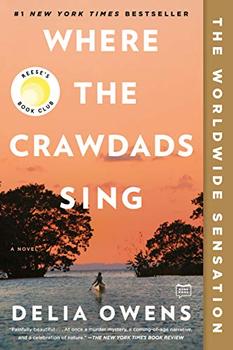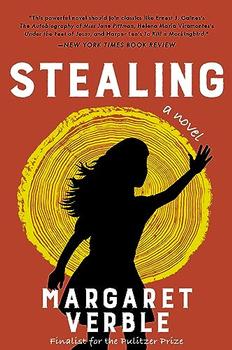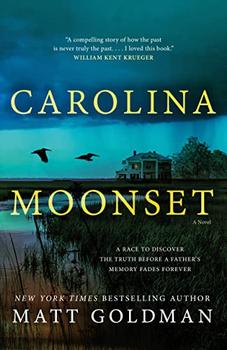Summary | Excerpt | Reading Guide | Reviews | Beyond the book | Read-Alikes | Genres & Themes | Author Bio

Voted 2018 Best Debut Award Winner by BookBrowse Subscribers
Where the Crawdads Sing was a hit even before being chosen for Reese Witherspoon's Hello Sunshine Book Club – and it's easy to see why so many have taken this debut novel into their hearts. It's a gripping mystery but also a tender coming-of-age story about one woman's desperately lonely upbringing and her rocky route to finding love and a vocation. Not only that, but its North Carolina marsh setting is described in lyrical language that evinces Delia Owens's background in nature writing (see Beyond the Book).
We first meet Kya Clark in 1952. The marshland surrounding the Clarks' shack has been a haven for fugitives and runaway slaves; though it's not far from Barkley Cove, it seems to have its own rules based on instinct and survival. Six-year-old Kya watches Ma leave with a blue suitcase in hand, and before long Pa's drunken violence has also driven off the last of her four older siblings, her brother Jodie.
Pa disappears for weeks at a time, leaving Kya to subsist on grits and soda crackers. The thought of a hot lunch lures her into attending second grade for a day, but after the kids call her "swamp trash" and make fun of her for not knowing how to spell, she vows to never set foot in school again. For years she survives by picking mussels and trading them for dry goods and kerosene at the general store run by Jumpin' and Mabel. As African Americans in the South, they know what it's like to be ostracized, and become like family to white Kya.
Kya's other source of support is Jodie's friend Tate, who shares her love of nature and teaches her to read when she's 14. Tate brings her rare feathers, science books and paint for her sketches. Their budding romance is cut short when Tate leaves for college. Although he promises to come back for Kya, the years pass and she's still alone, writing and illustrating field guides to the region's shells and birds. When she's 19, star quarterback Chase Andrews catches her eye and starts wooing her over picnics. Soon he's talking marriage, though he still hasn't introduced Kya to his parents or friends. Does he really love her, or is he just making a trophy out of "the Marsh Girl"?
Early on in the novel we learn that Chase Andrews will be found dead in 1969, having fallen from the fire tower into the swamp. No fingerprints or footprints are found; it doesn't seem like suicide or an accident. Soon rumor points to "the crazy lady on the marsh" because of her clandestine relationship with Chase. In between sections about Kya's childhood and adolescence, there are short updates on the 1969 investigation. As the two story lines converge, the chapters become more rapid-fire. Owens ramps up the tension, culminating in top-notch courtroom scenes as Kya stands trial for murder. The novel's third-person narration is coy, omitting certain scenes to allow readers to speculate right along with the prosecution.
Although the novel focuses on the years between 1965 and 1970, it encompasses the whole span of Kya's life. At times I found it hard to believe that the plucky urchin living off of grits and evading truant officers is the same character as the willowy nature writer wondering who will love her and never leave. Also, the chronology becomes slightly difficult to follow as it approaches 1969, and there are perhaps a few too many Amanda Hamilton poems. (You'll have to read the novel to find out more about who this fictional poet is!)
The use of animal behavior metaphors works very well, though. Kya understands her fellow humans by analogy, asking why a mother animal might leave her cubs or why males compete for female attention. The title refers to places where wild creatures do what comes naturally, and throughout the book we are invited to ponder how instinct and altruism interact and what impact human actions can have in the grand scheme of things, as in this passage about the marsh swallowing Chase's body: "the swamp is quiet because decomposition is cellular work. Life decays and reeks and returns to the rotted duff. … A swamp knows all about death, and doesn't necessarily define it as tragedy, certainly not a sin."
In Kya, Owens has created a truly outstanding character. The extremity of her loneliness makes her a sympathetic figure in spite of her oddities. If you like the idea of a literary novel flavored with elements of mystery and romance, and of a poetic writing style tempered with folksy Southern dialect, Crawdads is a real treat.
![]() This review was originally published in The BookBrowse Review in December 2018, and has been updated for the
April 2021 edition.
Click here to go to this issue.
This review was originally published in The BookBrowse Review in December 2018, and has been updated for the
April 2021 edition.
Click here to go to this issue.

If you liked Where the Crawdads Sing, try these:

by Margaret Verble
Published 2024
A gripping, gut-punch of a novel about a Cherokee child removed from her family and sent to a Christian boarding school in the 1950s—an ambitious, eye-opening reckoning of history and small-town prejudices from Pulitzer Prize finalist Margaret Verble.

by Matt Goldman
Published 2022
Both suspenseful and deeply moving, Carolina Moonset is an engrossing novel about family, memories both golden and terrible, and secrets too dangerous to stay hidden forever, from New York Times bestselling and Emmy Award–winning author, Matt Goldman.
Your guide toexceptional books
BookBrowse seeks out and recommends the best in contemporary fiction and nonfiction—books that not only engage and entertain but also deepen our understanding of ourselves and the world around us.